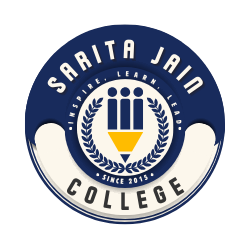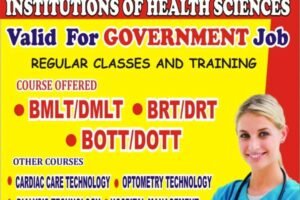The Role of Practical Training at Sarita Jain Paramedical College in Career Preparation
In the realm of healthcare education, theoretical knowledge alone is insufficient to prepare students for the demands of real-world practice. Practical training plays a crucial role in bridging the gap between classroom learning and professional application. Sarita Jain Paramedical College, a leading institution in healthcare education, understands this essential need and integrates extensive practical training into its curriculum. This article delves into how practical training at Sarita Jain Paramedical College significantly enhances career preparation for its students, equipping them with the skills and experience needed to excel in their chosen fields.

The Importance of Practical Training
Practical training is vital in healthcare education as it provides students with hands-on experience in real-world settings. Unlike theoretical learning, which focuses on concepts and principles, practical training involves applying this knowledge in clinical and operational environments. This approach helps students develop critical skills, gain confidence, and prepare for the complexities of their future careers.
Sarita Jain Paramedical College’s Approach to Practical Training
Sarita Jain Paramedical College is renowned for its comprehensive approach to practical training. The college integrates a variety of practical experiences into its programs to ensure that students are well-prepared for professional challenges. Here’s a closer look at how the college incorporates practical training into its curriculum:
1. Clinical Rotations and Internships
One of the cornerstone elements of practical training at Sarita Jain Paramedical College is the inclusion of clinical rotations and internships. These experiences are integral to several programs, including nursing, medical laboratory technology, and radiography.
Clinical Rotations: Nursing students participate in clinical rotations at affiliated hospitals and healthcare facilities. During these rotations, they work under the supervision of experienced professionals, engaging in direct patient care, performing clinical procedures, and gaining exposure to various medical specialties. This hands-on experience is crucial for developing clinical skills, understanding patient needs, and learning to work effectively in a healthcare team.
Internships: Students in programs such as Medical Laboratory Technology and Radiography undertake internships that provide them with practical experience in diagnostic settings. Internships allow students to operate medical equipment, conduct diagnostic tests, and analyze results. These experiences help students apply theoretical knowledge in real-world situations and gain valuable insights into their chosen fields.
2. Simulation-Based Training
Simulation-based training is another key component of practical learning at Sarita Jain Paramedical College. The college is equipped with advanced simulation labs that create realistic scenarios for students to practice their skills.
Simulation Labs: The simulation labs feature state-of-the-art mannequins and medical simulators that mimic real-life medical conditions and procedures. Students can practice emergency response, surgical techniques, and patient assessment in a controlled environment. This method allows them to refine their skills, learn to handle complex situations, and build confidence before encountering similar scenarios in actual clinical settings.
Virtual Reality (VR) and Augmented Reality (AR): The use of VR and AR technologies enhances the simulation experience by providing immersive, interactive learning environments. For example, VR can simulate intricate surgical procedures, while AR can overlay anatomical information onto physical models. These technologies offer students a deeper understanding of medical concepts and enhance their practical skills.
3. Community Health Projects
Community health projects are an integral part of practical training at Sarita Jain Paramedical College. These projects involve students working on public health initiatives and outreach programs, providing them with real-world experience in community settings.
Public Health Initiatives: Students participate in health awareness campaigns, vaccination drives, and wellness programs. These initiatives offer hands-on experience in public health practices, patient education, and community engagement. By working on these projects, students gain a broader perspective on healthcare and learn to address diverse health needs in the community.
Patient Education: Community health projects often include patient education components, where students educate individuals about health practices, disease prevention, and healthy lifestyles. This experience helps students develop communication skills, build rapport with patients, and understand the importance of preventive care.
4. Skill Development Workshops
Sarita Jain Paramedical College organizes skill development workshops that focus on enhancing specific competencies required in healthcare professions. These workshops cover a range of topics, including advanced clinical techniques, emergency procedures, and professional skills.
Hands-On Workshops: Workshops provide students with practical training in areas such as advanced cardiac life support (ACLS), pediatric care, and laboratory techniques. These hands-on sessions are conducted by industry experts and offer students the opportunity to practice and refine their skills in a supportive environment.
Professional Skills: In addition to technical skills, workshops also focus on developing professional competencies such as communication, teamwork, and ethical decision-making. These skills are essential for success in healthcare settings and contribute to overall career readiness.
The Impact of Practical Training on Career Preparation
The integration of practical training into the curriculum at Sarita Jain Paramedical College has a profound impact on students’ career preparation. Here’s how practical training contributes to their professional readiness:
1. Enhanced Skill Proficiency
Practical training allows students to develop and refine their technical skills. By working with real equipment, performing procedures, and interacting with patients, students gain hands-on experience that enhances their proficiency and prepares them for the demands of their chosen profession.
2. Increased Confidence
Exposure to practical scenarios builds students’ confidence in their abilities. The experience of handling real-world situations, making decisions, and applying their knowledge helps students feel more prepared and self-assured when entering the workforce.
3. Improved Problem-Solving Abilities
Practical training fosters critical thinking and problem-solving skills. Students learn to analyze complex situations, make informed decisions, and adapt to changing conditions. These abilities are crucial for navigating the challenges of healthcare environments and providing high-quality patient care.
4. Better Job Readiness
Employers value graduates who have practical experience and are familiar with real-world healthcare settings. Practical training at Sarita Jain Paramedical College equips students with the experience and skills that employers seek, making them more competitive in the job market.
5. Stronger Professional Network
Clinical rotations, internships, and community projects provide opportunities for students to connect with professionals in their field. Building a network of contacts can lead to valuable mentorship, job opportunities, and professional growth.
Student Certificate – Sarita Jain Paramedical College (saritajaincollege.com)
Conclusion
Practical training is a cornerstone of the educational approach at Sarita Jain Paramedical College, playing a vital role in preparing students for successful careers in healthcare. Through clinical rotations, simulation-based training, community health projects, and skill development workshops, the college ensures that students gain the hands-on experience and confidence needed to excel in their professions.

